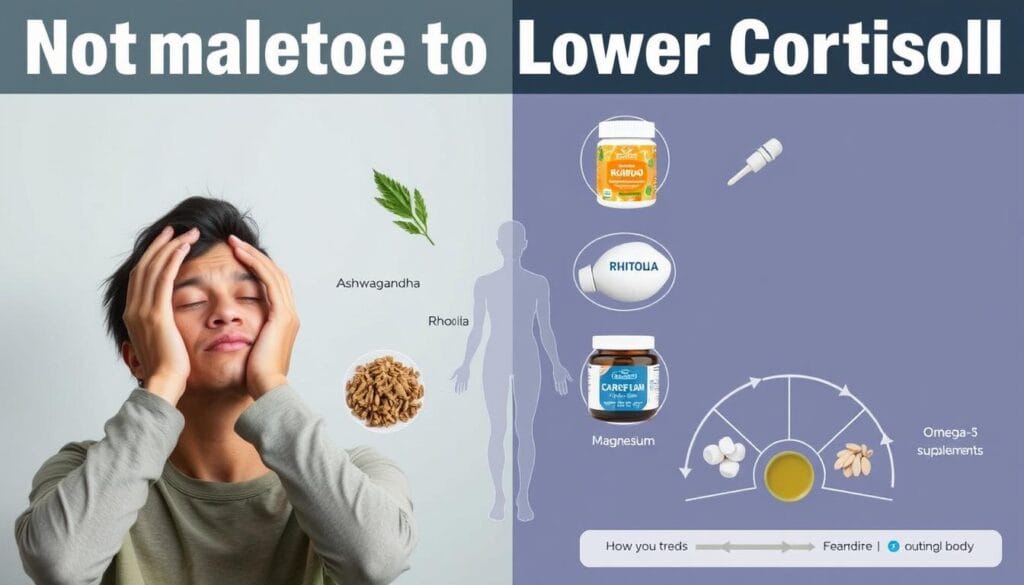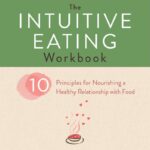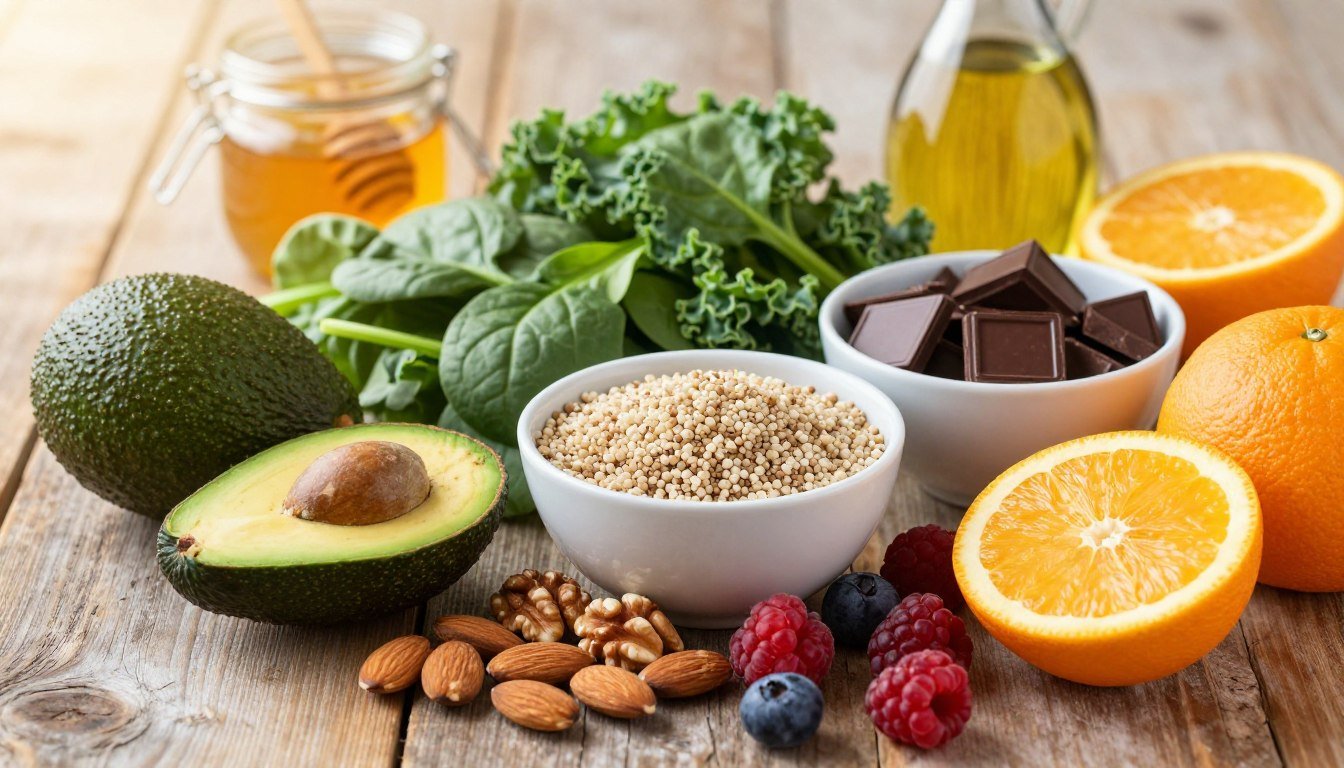As an Amazon Associate I earn from qualifying purchases.
Top 10 Supplements to Lower Cortisol Naturally
Clinically-Backed
Cortisol, often referred to as the “stress hormone,” plays a crucial role in your body’s response to stress. While cortisol is important for survival, high levels over time can harm your health. This can lead to weight gain, sleep disturbances, a weakened immune system, and even cognitive issues. If you are feeling the effects of stress, finding good supplements to lower cortisol can help your body and mind.

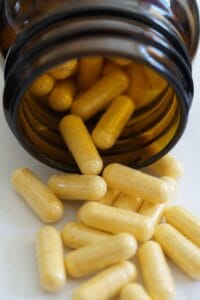
In this comprehensive guide, we’ll explore the top 10 science-backed supplements to reduce cortisol levels naturally. From powerful adaptogens to essential nutrients, these options have demonstrated real results in clinical studies. If you are feeling stressed at work, going through life changes, or dealing with anxiety, there are natural solutions that can help. These solutions can balance your stress response.
Understanding Cortisol: The Stress Hormone's Impact on Your Health
Before diving into supplements to lower cortisol, it’s important to understand what this hormone does and why balance matters. Cortisol is produced by your adrenal glands in response to stress signals from your brain. In healthy amounts, cortisol helps regulate metabolism, reduce inflammation, and control blood pressure
Signs of Elevated Cortisol
- Weight gain, especially around the abdomen
- Sleep disturbances and insomnia
- Fatigue and low energy levels
- Mood changes, anxiety, and irritability
- Weakened immune function
- Digestive issues and cravings
- Difficulty concentrating or “brain fog”
- Reduced muscle mass and bone density

Long-Term Health Risks
- Increased risk of anxiety and depression
- Compromised immune function
- Higher blood pressure and heart disease risk
- Insulin resistance and diabetes
- Hormonal imbalances
- Cognitive decline and memory issues
- Disrupted sleep patterns
- Accelerated aging processes
Did you know? Your body’s cortisol levels follow a daily pattern. They are highest in the morning to help you wake up. Then, they gradually decrease throughout the day. Chronic stress disrupts this pattern, keeping cortisol elevated when it should be declining.
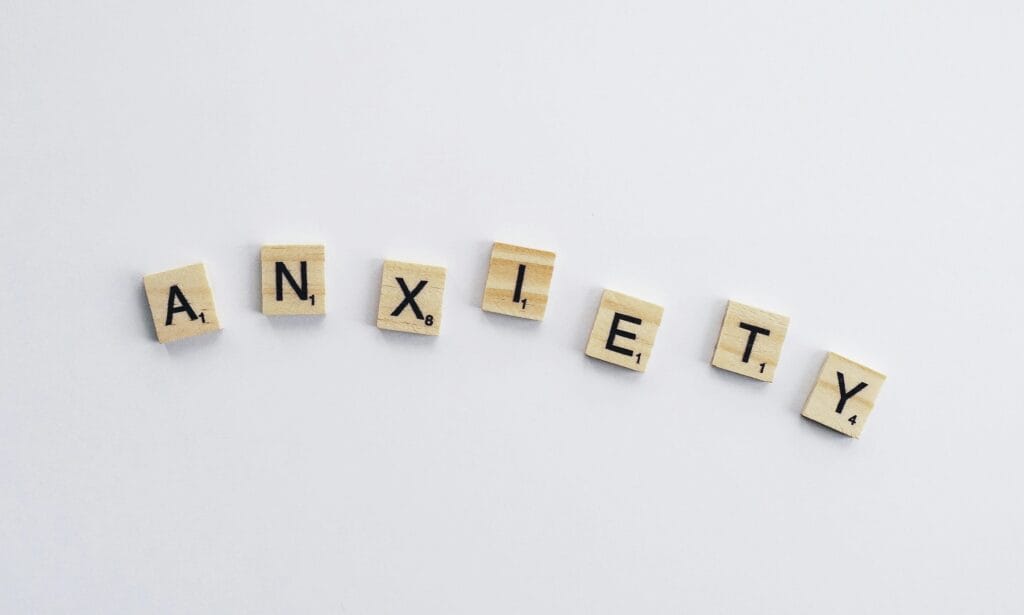
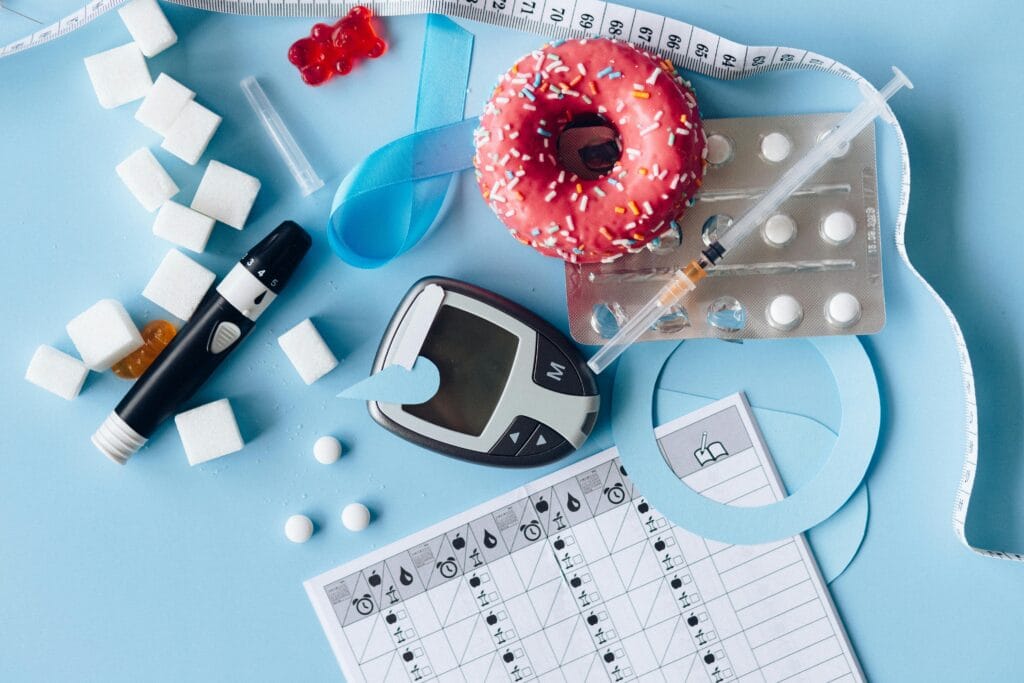
Ashwagandha: The Premier Adaptogen for Cortisol Balance
Ashwagandha (Withania somnifera) stands out as one of the most effective supplements to reduce cortisol levels. This strong adaptogenic herb has been used in Ayurvedic medicine for over 3,000 years. It also has great research showing its ability to reduce stress.
Ashwagandha root and supplements have been clinically proven to reduce cortisol levels by up to 30% in some studies
Key Benefits & Science-Backed Dosages
Multiple clinical studies have demonstrated ashwagandha’s ability to significantly reduce cortisol levels. In a study, participants took ashwagandha or a placebo. Those who took ashwagandha had a 28% drop in cortisol levels compared to the placebo group.
How Ashwagandha Works:
- Regulates the hypothalamic-pituitary-adrenal (HPA) axis
- Contains withanolides that help reduce stress response
- Modulates neurotransmitters involved in stress and anxiety
- Provides antioxidant protection against stress-induced damage
Recommended Dosage:
300-600 mg daily of a standardized extract containing 5% withanolides. For best results, take consistently for at least 8 weeks.
Best For:
- Daily stress management
- Reducing anxiety symptoms
- Improving sleep quality
- Supporting overall adrenal health
“Ashwagandha is one of the few herbs with substantial clinical evidence supporting its traditional use for stress reduction. Its ability to lower cortisol makes it my first recommendation for patients dealing with chronic stress.”
Phosphatidylserine: Blunt Your Cortisol Response to Acute Stress
Phosphatidylserine (PS) is a phospholipid that makes up part of the cell membrane structure, particularly in brain cells. It’s one of the best supplements to lower cortisol during stress. This makes it very useful for athletes and high achievers.
Phosphatidylserine helps regulate the body’s cortisol response, particularly during high-stress activities
Key Benefits & Science-Backed Dosages
Research shows that phosphatidylserine can significantly blunt the cortisol response to acute stressors, including intense exercise and mental challenges. One study found that PS supplementation reduced cortisol levels by 30% in response to exercise stress.
How Phosphatidylserine Works:
- Modulates the secretion of ACTH, which triggers cortisol release
- Maintains healthy cell membrane function in the brain
- Supports neurotransmitter systems involved in stress response
- Helps prevent exercise-induced cortisol spikes
Recommended Dosage:
200-400 mg daily, with higher doses (up to 800 mg) sometimes used for acute stress situations or athletic performance.
Best For:
- Athletes and fitness enthusiasts
- Acute stress situations (presentations, exams)
- Cognitive performance under pressure
- Preventing exercise-induced muscle breakdown
Rhodiola Rosea: Enhance Stress Resilience and Energy
Rhodiola Rosea is a powerful adaptogenic herb that grows in cold, mountainous regions of Europe and Asia. It has been used for many years to fight fatigue. It also helps improve physical and mental performance during stress. This makes it a great supplement to lower cortisol and its effects.
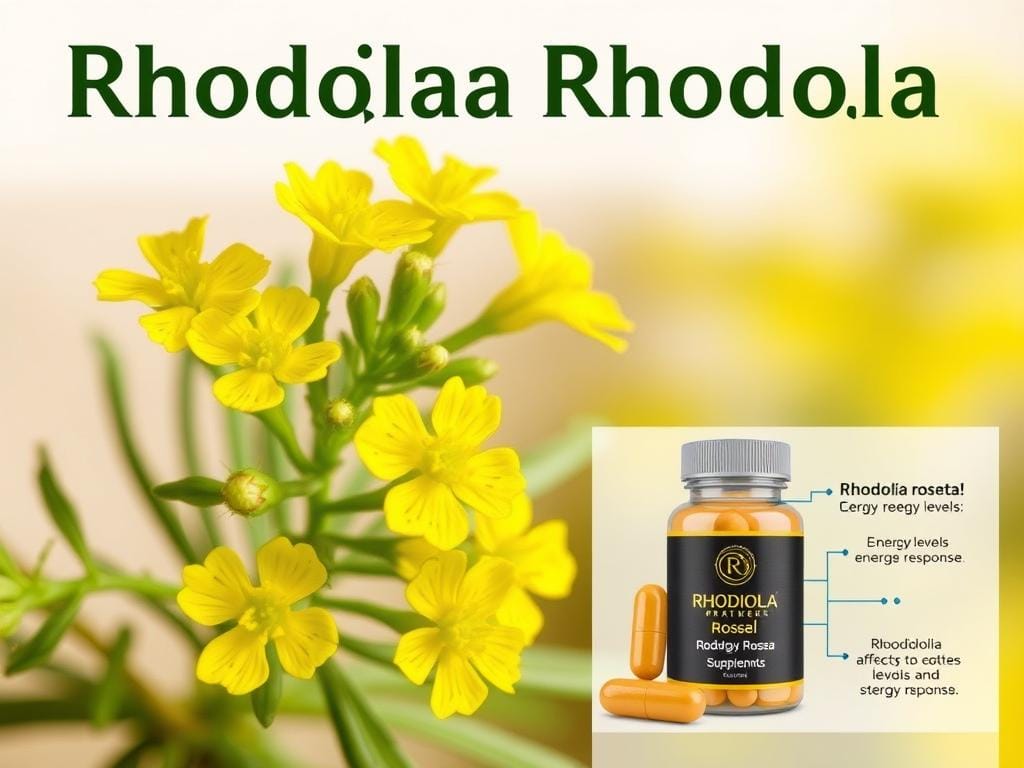
Key Benefits & Science-Backed Dosages
Clinical studies show that Rhodiola can help reduce cortisol levels while simultaneously improving energy, focus, and mood. It’s particularly effective for stress-related fatigue and burnout.
How Rhodiola Works:
- Contains active compounds (rosavins and salidrosides) that modulate stress response
- Helps normalize HPA axis function during chronic stress
- Supports healthy levels of neurotransmitters like serotonin and dopamine
- Provides neuroprotective and antioxidant effects
Recommended Dosage:
200-400 mg daily of an extract standardized to contain 3% rosavins and 1% salidroside. Best used in cycles of 4-6 weeks with breaks to prevent tolerance.
Best For:
- Combating stress-related fatigue
- Improving mental performance during stress
- Enhancing physical endurance
- Supporting mood during stressful periods
Important Note: Rhodiola may interact with certain medications, including antidepressants, blood pressure medications, and diabetes drugs. Always consult with a healthcare provider before starting Rhodiola, especially if you’re on medication.
Comparing Top Supplements to Lower Cortisol
To help you pick the best supplements for your needs, we made this easy comparison. It looks at the top cortisol-lowering supplements. We based it on scientific evidence, how quickly they work, and their specific benefits.
| Supplement | Effectiveness | Onset Time | Dosage | Best For | Special Considerations |
| Ashwagandha | ★★★★★ | 2-4 weeks | 300-600 mg daily | Daily stress, anxiety, sleep | May increase thyroid hormone levels |
| Phosphatidylserine | ★★★★☆ | 1-2 weeks | 200-400 mg daily | Acute stress, exercise recovery | Choose soy-free options if sensitive |
| Rhodiola Rosea | ★★★★☆ | 1-2 weeks | 200-400 mg daily | Fatigue, mental performance | Cycle use to prevent tolerance |
| Magnesium | ★★★★☆ | 1-2 weeks | 200-400 mg daily | Sleep, muscle tension | Choose glycinate for best absorption |
| Omega-3s | ★★★☆☆ | 4-8 weeks | 1,000-2,000 mg EPA/DHA | Inflammation, brain health | Quality matters; check for purity |
Omega-3 Fatty Acids: Reduce Inflammation and Cortisol
Omega-3 fatty acids, especially EPA and DHA, are important fats. They help with brain health and control inflammation. Research shows they’re also effective supplements to reduce cortisol levels over time.
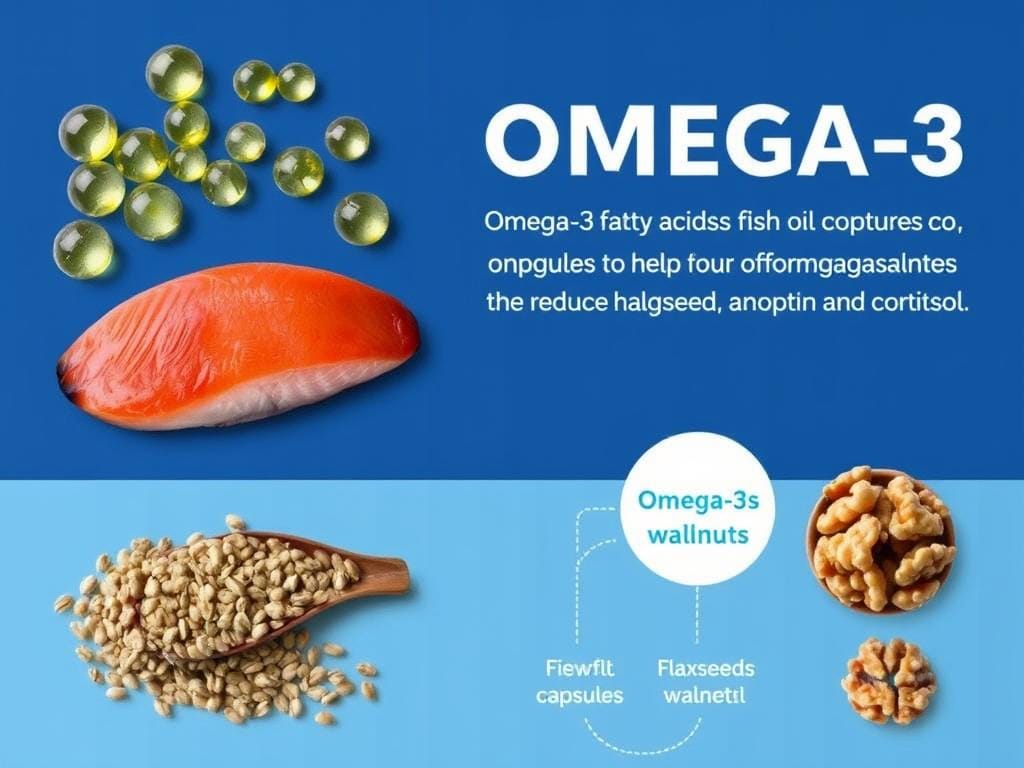
Key Benefits & Science-Backed Dosages
A study from 2021 showed that people who took 2.5 grams of omega-3s daily had lower cortisol levels. Their cortisol levels dropped by up to 33% in four months. These essential fats work by reducing inflammation and supporting healthy brain function.
How Omega-3s Work:
- Reduce systemic inflammation that can trigger cortisol release
- Support healthy cell membrane function in the brain
- Help regulate neurotransmitter systems involved in stress response
- Improve HPA axis sensitivity and feedback mechanisms
Recommended Dosage:
1,000-2,000 mg of combined EPA and DHA daily, with a higher ratio of EPA for stress and mood benefits.
Best For:
- Reducing chronic inflammation
- Supporting brain health during stress
- Improving mood and emotional resilience
- Long-term stress management
Pro Tip: While supplements are convenient, you can also increase your omega-3 intake through diet. Cold-water fatty fish like salmon, sardines, and mackerel are excellent sources. Plant-based options include flaxseeds, chia seeds, and walnuts, though they contain ALA which must be converted to EPA and DHA in the body.
Magnesium: The Relaxation Mineral for Cortisol Control
Magnesium is an essential mineral involved in over 300 biochemical reactions in the body. It’s very important for stress response. This makes it one of the best supplements to lower cortisol levels and help you relax.
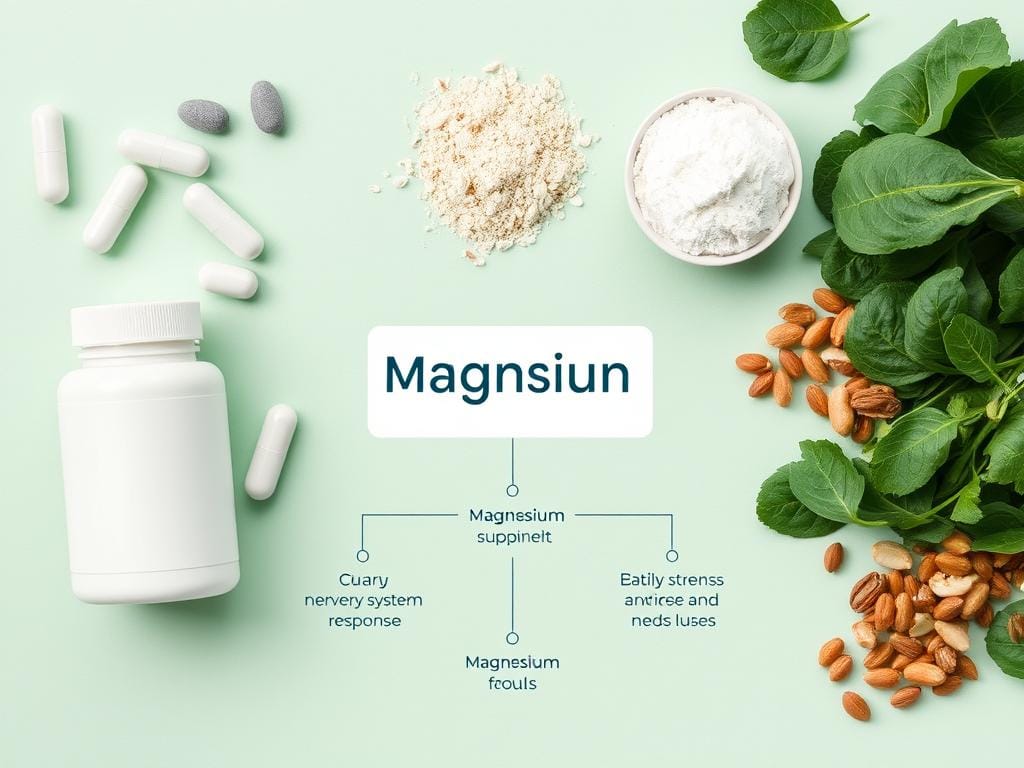
Key Benefits & Science-Backed Dosages
Studies show that magnesium supplementation can help regulate the HPA axis and reduce cortisol secretion. It’s particularly effective for stress-related symptoms like muscle tension, anxiety, and sleep disturbances.
How Magnesium Works:
- Acts as a natural calcium channel blocker, helping muscles and nerves relax
- Supports GABA production, the brain’s main inhibitory neurotransmitter
- Helps regulate the HPA axis response to stress
- Supports healthy sleep patterns, which helps normalize cortisol rhythm
Recommended Dosage:
200-400 mg daily, preferably in the evening for sleep benefits.
Choosing the Right Form of Magnesium
Magnesium Glycinate: Most bioavailable form, gentle on the stomach, best for anxiety and sleep
Magnesium Threonate: Crosses the blood-brain barrier effectively, ideal for cognitive stress
Magnesium Citrate: Good absorption but may have a laxative effect
Magnesium Malate: Well-absorbed and may help with muscle pain and fatigue
Best For:
- Sleep improvement
- Muscle tension and physical stress symptoms
- Anxiety and racing thoughts
- Supporting overall stress resilience
L-Theanine: Calm Focus Without Sedation
L-theanine is an amino acid found naturally in green tea that promotes a state of calm alertness. It’s one of the quickest supplements to lower cortisol and anxiety. It does this without making you sleepy, so it’s great for managing stress during the day.
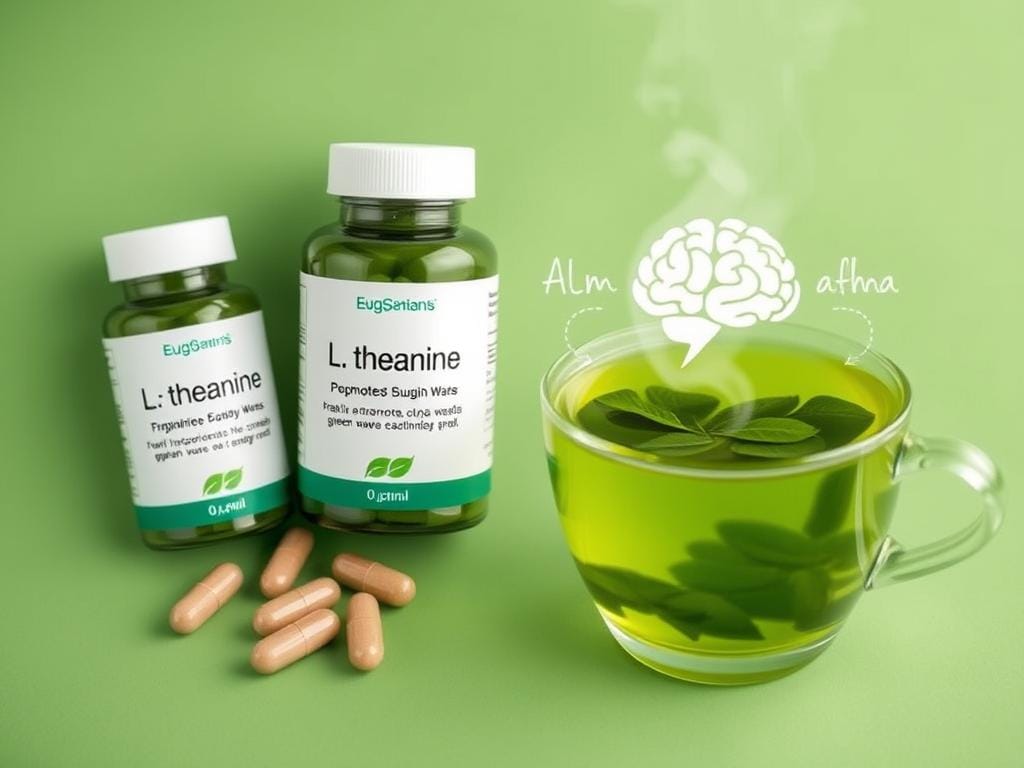
Key Benefits & Science-Backed Dosages
Research shows that L-theanine can reduce physiological and psychological stress responses, including cortisol elevation. It works quickly, often within 30-40 minutes of consumption.
How L-Theanine Works:
- Increases alpha brain waves associated with relaxed alertness
- Modulates the release of excitatory neurotransmitters
- Helps blunt the cortisol response to acute stressors
- Balances the stimulating effects of caffeine when taken together
Recommended Dosage:
100-400 mg daily, with 200 mg being the most commonly studied effective dose. Can be taken multiple times throughout the day as needed.
Best For:
- Acute stress situations
- Promoting calm focus during work or study
- Balancing caffeine consumption
- Daytime anxiety without sedation
Stack Tip: L-theanine works great with caffeine in a 2:1 ratio. Use 200 mg of L-theanine for every 100 mg of caffeine. This combination promotes focused energy without the jitters or cortisol spike that caffeine alone can cause.
Holy Basil (Tulsi): Ancient Adaptogen for Modern Stress
Holy Basil, also known as Tulsi, is a sacred herb in Ayurvedic medicine with powerful adaptogenic properties. It’s one of the most versatile supplements to lower cortisol while supporting overall vitality and immune function.
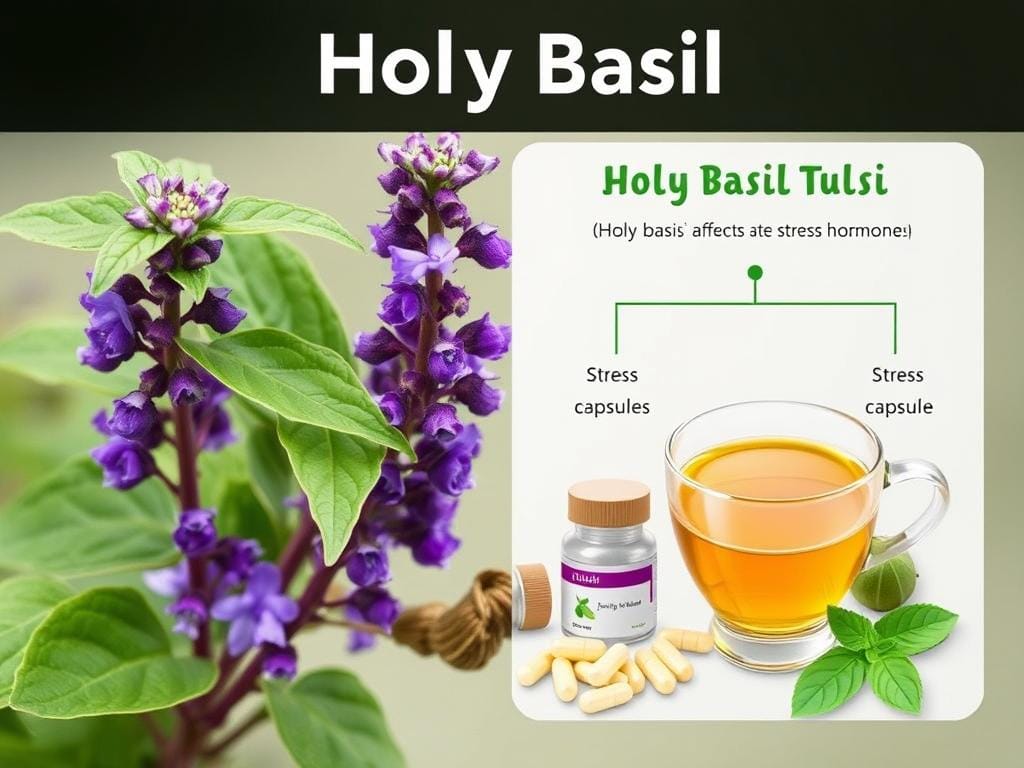
Key Benefits & Science-Backed Dosages
Studies show that Holy Basil can significantly reduce cortisol levels while enhancing adaptive energy and emotional balance. It contains unique compounds that support both physical and mental resilience to stress.
How Holy Basil Works:
- Contains adaptogenic compounds that help normalize cortisol levels
- Provides antioxidant protection against stress-induced damage
- Supports healthy inflammatory response during stress
- Helps balance blood sugar levels, which can spike during stress
Recommended Dosage:
300-600 mg daily of a standardized extract, or 1-2 cups of holy basil tea.
Best For:
- Balancing emotional response to stress
- Supporting immune function during stressful periods
- Promoting mental clarity and focus
- Supporting overall vitality and resilience
Vitamin C: Essential Support for Adrenal Function
Vitamin C is more than just an immune booster—it’s a critical nutrient for adrenal function and cortisol regulation. The adrenal glands have a high amount of vitamin C. This makes it a key supplement to lower cortisol during stress.
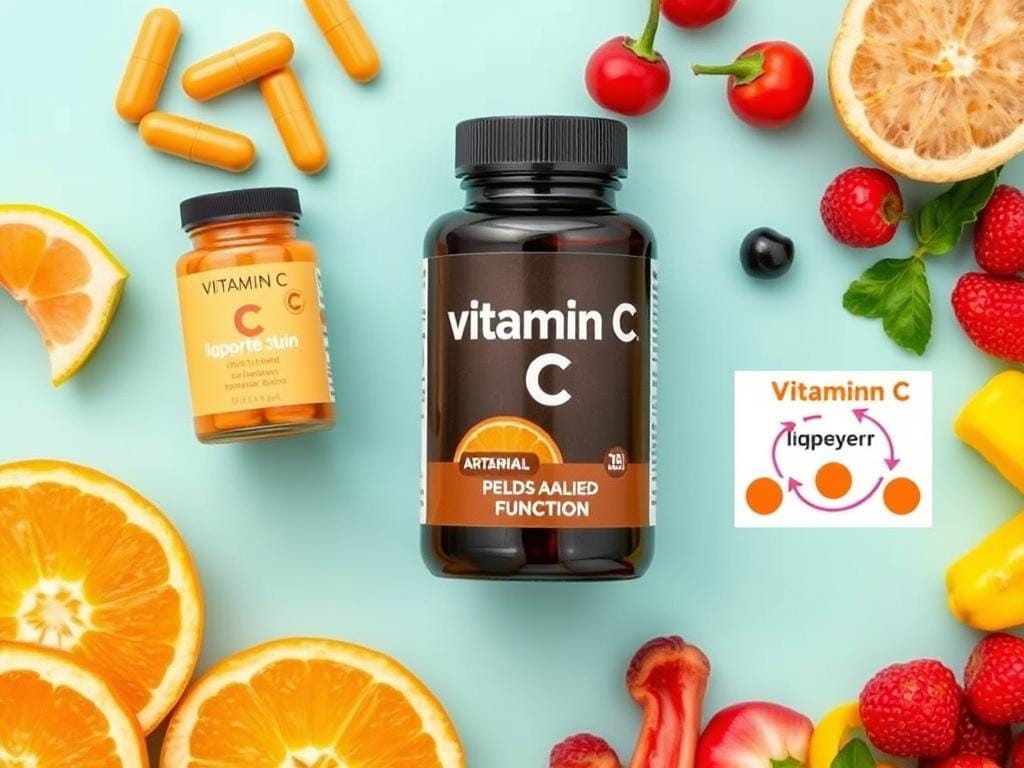
Key Benefits & Science-Backed Dosages
Research shows that vitamin C supplementation can help reduce cortisol levels, particularly during acute stress situations. It’s also essential for the production of stress hormones, helping maintain healthy adrenal function.
How Vitamin C Works:
- Supports healthy adrenal gland function and hormone production
- Provides antioxidant protection against stress-induced oxidative damage
- Helps reduce cortisol spikes during acute stress
- Supports immune function, which can be compromised during chronic stress
Recommended Dosage:
500-1,000 mg daily, with higher doses (up to 2,000 mg) during periods of acute stress or illness.
Best For:
- Supporting adrenal function during stress
- Reducing cortisol spikes during acute stress
- Maintaining immune function during stressful periods
- Supporting overall resilience and recovery
B-Complex Vitamins: Energetic Support for Stress Resilience
B-complex vitamins are essential cofactors in energy production and neurotransmitter synthesis. They’re particularly important during stress, making them valuable supplements to help mitigate cortisol’s impact on the body and mind.
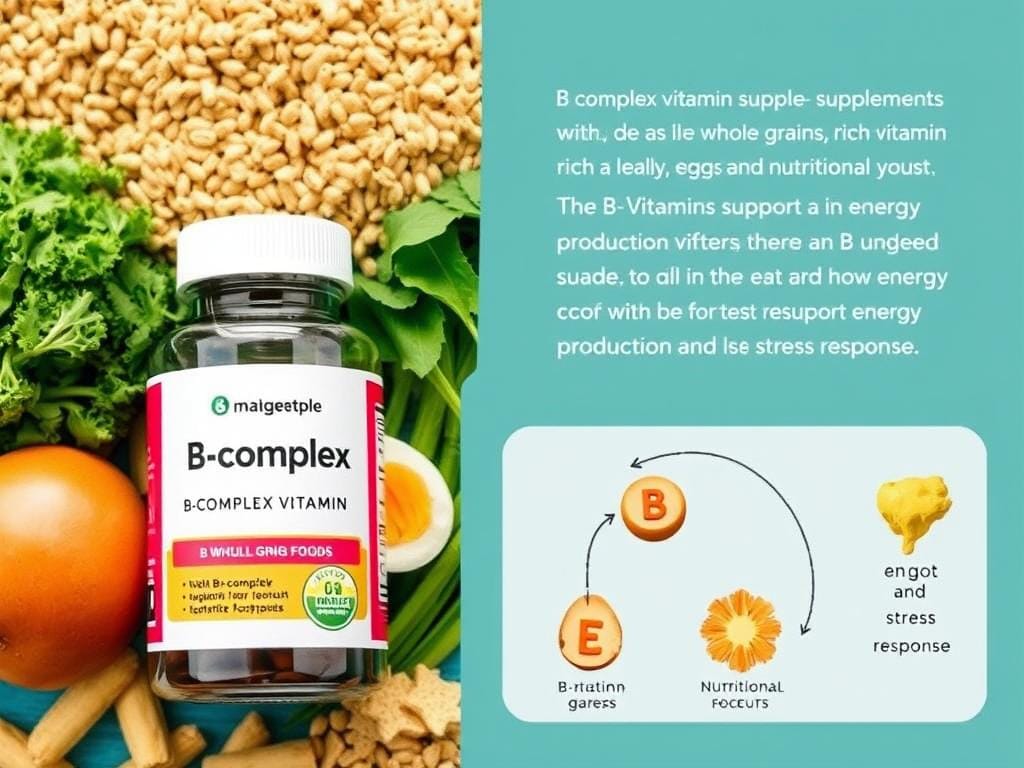
Key Benefits & Science-Backed Dosages
Research shows that B vitamins are important for healthy adrenal function and stress response. This includes B5 (pantothenic acid), B6, and B12. Deficiencies in these vitamins can exacerbate the effects of stress and impair recovery.
How B Vitamins Work:
- Support energy production during stress (B1, B2, B3, B5)
- Aid in neurotransmitter synthesis for mood regulation (B6, folate, B12)
- B5 (pantothenic acid) is particularly important for adrenal hormone production
- Help maintain healthy nervous system function during stress
Recommended Dosage:
A high-quality B-complex supplement that provides 100% of the Daily Value for all B vitamins. Individual needs may vary depending on stress levels and dietary habits.
Key B Vitamins for Stress:
- B5 (Pantothenic Acid): 50-100 mg daily for adrenal support
- B6 (Pyridoxine): 50-100 mg daily for neurotransmitter support
- B12 (Cobalamin): 500-1,000 mcg daily for energy and the nervous system
- Folate: 400-800 mcg daily (preferably as methylfolate)
Relora®: Proprietary Blend for Stress-Related Eating and Anxiety
Relora® is a patented blend of Magnolia officinalis and Phellodendron amurense bark extracts specifically formulated to help manage stress-related eating and anxiety. It’s one of the most targeted supplements to reduce cortisol for those who experience stress-induced cravings.
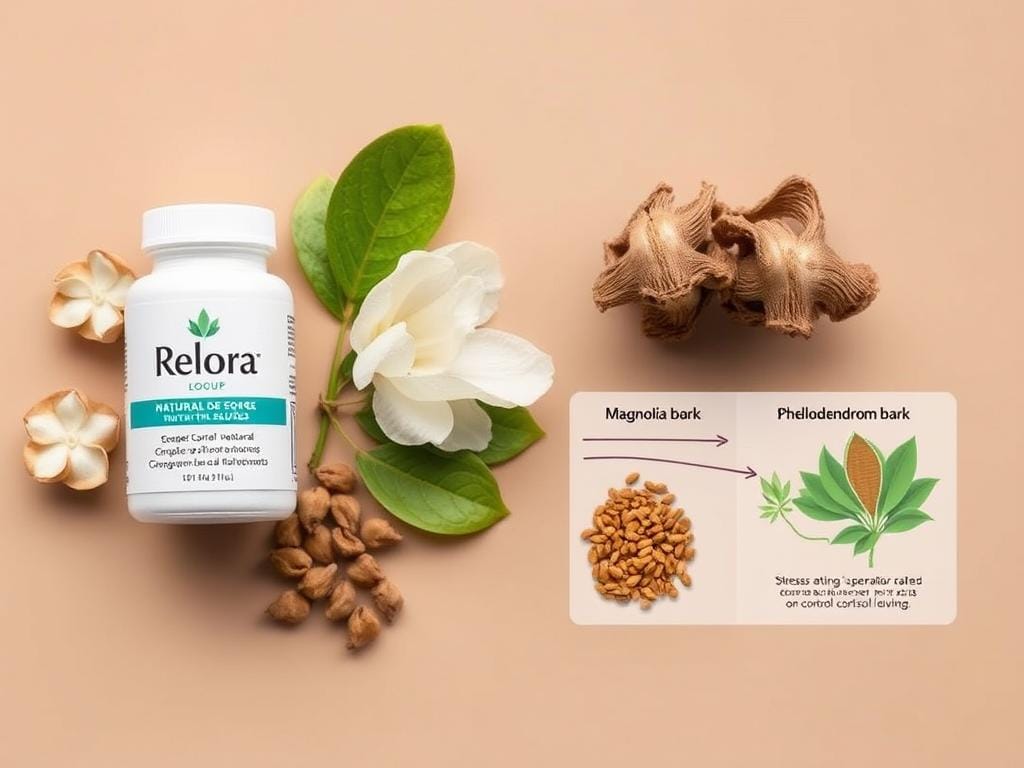
Key Benefits & Science-Backed Dosages
Clinical studies show that Relora can lower cortisol levels and reduce stress. It also helps maintain healthy eating habits during stressful times. It works by modulating the HPA axis and supporting GABA activity in the brain.
How Relora Works:
- Contains bioactive compounds that help modulate cortisol production
- Supports healthy GABA activity for relaxation without sedation
- Helps reduce stress-related food cravings and emotional eating
- Promotes healthy sleep patterns without morning grogginess
Recommended Dosage:
250 mg, 2-3 times daily, for a total of 500-750 mg per day.
Relora’s Dual-Action Benefits
What makes Relora unique is its ability to address both the psychological and physiological aspects of stress:
- Stress Reduction: Helps lower perceived stress and anxiety
- Appetite Regulation: Helps manage stress-induced cravings and emotional eating
Best For:
- Managing stress-related eating and cravings
- Supporting healthy weight management during stress
- Reducing anxiety without sedation
- Promoting healthy sleep patterns
Pro Tips: Timing, Stacking, and Maximizing Benefits
To maximize the benefits of supplements for lowering cortisol, consider these expert strategies for timing, combining supplements, and incorporating them into your lifestyle practices.
Optimal Timing
- Morning: Rhodiola, B-complex, Vitamin C
- With Meals: Ashwagandha, Omega-3s, Holy Basil
- Evening: Magnesium, Relora, Phosphatidylserine
- As Needed: L-theanine (for acute stress)
Effective Stacking
- Daily Stress: Ashwagandha + Magnesium
- Mental Performance: Rhodiola + L-theanine
- Sleep Support: Magnesium + Relora
- Physical Recovery: Phosphatidylserine + Omega-3s
Lifestyle Integration
- Take adaptogens consistently for 4-8 weeks
- Combine with regular exercise (not excessive)
- Practice stress-reduction techniques daily
- Prioritize 7-9 hours of quality sleep
Safety First: Always talk to a healthcare provider before starting any new supplements. This is important if you have health conditions or take medications. Some supplements can interact with medications or may not be appropriate for certain conditions.
Finding Your Personalized Cortisol-Lowering Protocol
Different stress patterns require different approaches to cortisol management. Use this guide to identify which supplements to lower cortisol might work best for your specific situation.
For Chronic Daily Stress
- Primary: Ashwagandha (300-600 mg daily)
- Support: Magnesium (300-400 mg evening)
- Add: B-complex (morning)
- Consider: Holy Basil for emotional balance
- Duration: Consistent use for 8-12 weeks
For Performance & Acute Stress
- Primary: Phosphatidylserine (300 mg daily)
- Support: L-theanine (200 mg as needed)
- Add: Rhodiola (200 mg morning)
- Consider: Vitamin C before stressful events
- Duration: Cycle Rhodiola 6 weeks on/2 off
For Stress-Related Sleep Issues
- Primary: Magnesium glycinate (300-400 mg)
- Support: Relora (250 mg before bed)
- Add: Ashwagandha (300 mg evening)
- Consider: L-theanine for racing thoughts
- Duration: Consistent evening routine
Get Your Personalized Cortisol Management Plan
Discover exactly which supplements will work best for your unique stress pattern and health goals. Our free guide includes detailed protocols, timing recommendations, and expert tips for maximum effectiveness.
Beyond Supplements: Lifestyle Practices to Lower Cortisol
Supplements can help lower cortisol levels. They work best when used with lifestyle habits that improve stress resilience. Incorporate these evidence-based strategies for comprehensive cortisol management.
Daily Practices
- Prioritize sleep quality – Aim for 7-9 hours of uninterrupted sleep in a cool, dark room. Consider a magnesium supplement before bed.
- Practice mindfulness – Just 10 minutes of daily meditation or deep breathing can significantly reduce cortisol levels.
- Engage in moderate exercise – 30 minutes of walking, yoga, or strength training can help regulate cortisol patterns. Avoid excessive high-intensity exercise if stressed.
- Maintain blood sugar balance – Eat regular meals with protein, healthy fats, and fiber to prevent cortisol spikes from hypoglycemia.
- Limit caffeine and alcohol – Both can disrupt cortisol rhythms and sleep quality. Consider L-theanine with coffee to mitigate effects.
Stress-Response Techniques
- Practice the 4-7-8 breathing technique – Inhale for 4 counts, hold for 7, exhale for 8. This activates the parasympathetic nervous system.
- Use adaptogens strategically – Take ashwagandha or rhodiola before anticipated stressful events.
- Implement “worry time” – Schedule 15 minutes daily to write down worries, then mentally “put them away” until the next session.
- Connect socially – Positive social interactions release oxytocin, which counteracts cortisol’s effects.
- Spend time in nature – Just 20 minutes in a natural setting can significantly lower cortisol levels.
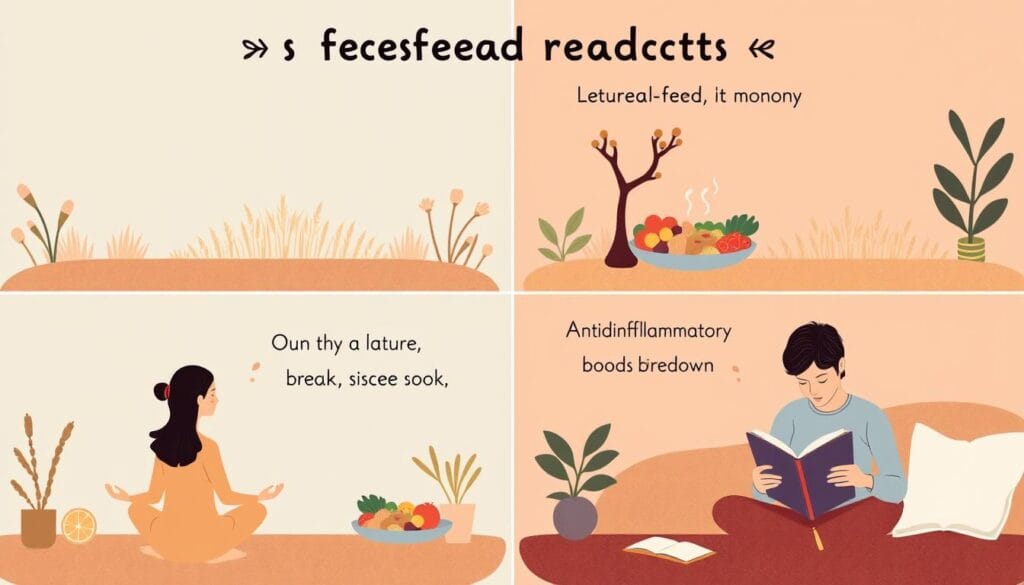
Conclusion: Your Path to Balanced Cortisol and Better Health
Managing cortisol levels is a crucial aspect of overall health and wellbeing in our stress-filled world. The supplements in this guide can help lower cortisol. They provide proven ways to support your body’s natural stress response.
Remember that consistency is key when using adaptogens and other cortisol-lowering supplements. Most require several weeks of regular use to achieve optimal benefits. Start with one or two that best match your specific stress pattern, and gradually build your protocol as needed.
Always prioritize quality when selecting supplements, looking for standardized extracts, third-party testing, and reputable manufacturers. And most importantly, view supplements as part of a holistic approach that includes stress management practices, quality sleep, balanced nutrition, and regular movement.
By taking a comprehensive approach to cortisol management, you can enhance your resilience to stress, improve your energy and focus, and support your long-term health and wellbeing.
Ready to Take Control of Your Stress Response?
Start with our top-recommended supplements based on your unique stress pattern, or download our comprehensive guide for personalized protocols and expert tips.
Amazon and the Amazon logo are trademarks of Amazon.com, Inc or it's affiliates.
Related Posts
- Ultimate Guide to the Cortisol Diet
Ultimate Guide to the Cortisol Diet Feeling drained or overwhelmed? Many people struggle with fatigue…
- Reduce Stress with Fitness
How to Reduce Stress with Fitness Table of Contents Improve Mood Stress has become an…
- Best Tips to Stop Stress Eating
Best Tips to Stop Stress Eating In today's fast-paced world, stress has become an inevitable…
- 9 Effective Natural Stress-Relief Techniques
9 Effective Natural Stress Relief Techniques Introduction to Stress and Its Effects Stress is a…
- Amazing Top 10 Superfoods to Boost Your Immune System
Amazing Top 10 Superfoods to Boost Your Immune System Maintaining a robust immune system is…

